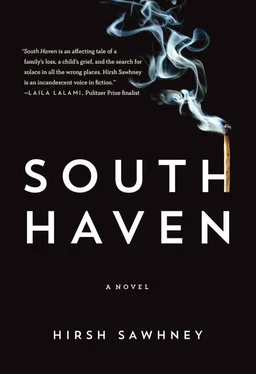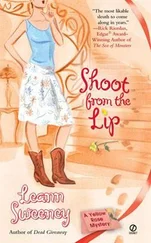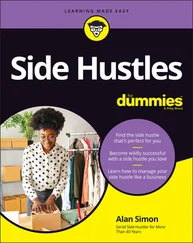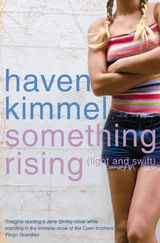“Of what?”
“Your goddamn book.”
“Yeah, right. Grow up, Sid. You’re almost a teenager. You gotta stop acting like a child.”
“Yeah, I’m the child.” He stared out at the beige-colored fields of Miller Farm, where a few fat cows were lazing about. “I’m not the one who’s going out with an Indian girl. Who would do that? That’s disgusting.”
Arjun pulled over close to the old Miller farmhouse, where Sharon Nagorski’s great-uncle still lived. “What did you say?”
“You heard me. Who the hell would want an Indian girlfriend?”
“You don’t know how stupid you sound.” Arjun shifted into park, then turned off the engine. “But I suppose it isn’t your fault.” He grunted. “You’re so brainwashed. And for your information, she’s not even Indian.”
“Right. I guess she’s Polish. Chinese maybe?”
“Just drop it.” Arjun started up the car.
“Is she from Siberia? Where was she born? Oh, I know — Mars?”
“Stop, Siddharth. You’re making a fool of yourself.”
“I’m a fool? You’re the one who’s screwing a freaking Indian.”
“You’re an idiot,” Arjun said, twisting up his lips. “And she’s definitely not Indian.”
“So where’s she from then?”
“None of your business.”
“Tell me.”
“She’s from Michigan, alright?” Arjun was gripping the steering wheel so hard that his knuckles turned white. “And her parents — they’re from Pakistan.”
“You’re joking.”
“Would you just shut up? And not a word to Dad.”
“What are you gonna do about it? Beat me up?”
Arjun reached over and grabbed the back of Siddharth’s neck.
“Ow!”
“No, but if you say anything, it’s over between us. I won’t even look in your direction.”
* * *
On the final night of Arjun’s visit, the plan was for everyone to go out to dinner and a movie. Siddharth was dreading the evening. He and his brother had made up, but since they had wasted some precious time fighting, he wanted to be alone with Arjun — or at least have it be a family affair, just the two of them and Mohan Lal. An hour before they were scheduled to leave, Marc claimed to have a stomachache and said he wasn’t coming, which eased some of Siddharth’s tension. At seven p.m., everyone else piled into the minivan and headed toward Pasta Palace. Ms. Farber had decided she didn’t care for the place, calling it loud and garish. But Siddharth still liked it, and it remained Mohan Lal’s favorite restaurant.
As they approached the center of South Haven, Mohan Lal told Arjun about the shady land deal that had led to the destruction of the Carter Family Horse Farm, which had been turned into a new complex of large luxury homes. Converting this type of agricultural land into commercial property was illegal, but Mrs. Carter, the town treasurer, was friendly with the South Haven mayor, Bob Swirsky. Swirsky had the town charter amended so that she could sell the land quickly, and for lots of money. Within a few months, Mrs. Carter had bought a brand-new six-bedroom home in Woodford. Bob Swirsky was driving around South Haven in an S-class Mercedes.
Mohan Lal said, “What a marvelous place that farm was. But corruption has a way of spoiling beauty.”
“Bob Swirsky?” said Arjun. “I think he used to be my bus driver. Always seemed kind of sleazy.”
“Ah, small-town politics,” said Ms. Farber. “Aren’t they just charming?”
Siddharth stared out the window at the new luxury mansions, which were still empty, not even up for sale yet. He didn’t miss the Carter Farm. He barely ever thought about those afternoons with his father and the horses. As far as he was concerned, they could destroy every single farm in town. If there were more mansions in South Haven, then they would be cheaper, and the Aroras would be able to afford one.
When they got to Pasta Palace, the restaurant was crowded as usual. The hostess, who had abundant cleavage and lots of hair spray, told them they would have to wait for at least twenty-five minutes. But Mustafa, the Pakistani manager, came over and said, “Sweetheart, these are my oldest customers. I think we can squeeze ’em in Beth’s section.” He slapped her on the ass, then kissed another customer on each of her cheeks.
Ten minutes later, they were seated at a cushioned booth. The clamor of conversation and clanking silverware had a calming effect on Siddharth, who made sure that his knee was touching his brother’s thigh. Arjun would be gone tomorrow, and he wanted to remain as close to him as possible for the next eighteen hours. Their waitress, Beth, had spiky hair and called everyone “honey.” Siddharth told her he wanted his usual, baked spinach ravioli, and Ms. Farber ordered soup and salad. She shot Mohan Lal a look when he ordered the veal parmigiana, and he changed his order to broiled scrod. She told Arjun that he was young still, and that he should try the veal.
“I’ll have the eggplant,” said Arjun. “Eating veal’s a tad uncivilized.”
As they ate bread and salad, Ms. Farber told Arjun that studying premed was admirable. “I’m sure your mother would have been very proud.”
Siddharth coughed, then downed some ice water.
“Actually,” said Arjun, “I’ve been meaning to mention it. I’m not really sure medicine is for me anymore.”
“What?” said Mohan Lal, crunching a piece of lettuce.
“Let me guess,” said Ms. Farber. “Law school?”
Arjun started fiddling with his facial hair. “Actually, I find the humanities very inspiring. I’m thinking about becoming a history major.”
Ms. Farber smiled. “You’ll be a professor, just like Dad.” She patted Mohan Lal on the shoulder.
“No, not like my father,” said Arjun.
Mohan Lal took a swig from his bottle of Becks. A pimply busboy dropped off a fresh basket of bread. Siddharth knew the busboy’s little brother, who was a fifth grader at Deer Run.
“History,” said Ms. Farber. “Are we talking Potsdam? Or Napoleon?”
“More like South Asia,” said Arjun.
Ms. Farber squinted. “You mean Vietnam?”
Mohan Lal scoffed at her. “ South Asia is a term invented by the CIA,” he said. “It refers to the region that was once British India.”
Arjun shook his head. “Why do you always have to be so cynical?”
Siddharth nudged his brother.
The waitress arrived to clear their salad bowls. “We all set with drinks here?”
“I’ll have another beer,” said Mohan Lal.
“I’ll have one too,” said Arjun.
Ms. Farber told Arjun that he would make a great history professor. She told him that he would be a big help with the book Mohan Lal was writing about India.
“I highly doubt it,” said Arjun.
Siddharth didn’t like the way his brother was smiling, sensing trouble.
The waitress arrived with their beers, and Mohan Lal took a long sip. “You doubt it?” he said. “Son, what is it that you doubt?”
“Forget it,” Arjun responded.
“Be a man,” said Mohan Lal. “Speak your mind.”
“You want me to be a man? What does that even mean?”
Ms. Farber squeezed Mohan Lal’s wrist. “Arjun, I think your father just wants you to communicate a little more clearly.”
Arjun drank from his green bottle, then shook his head. “What I’m saying is that I want no part of that thing. I’m saying that I could never work with someone like him.”
Siddharth gave his brother a light kick on the shin. Arjun then stomped on his toes, and he had to bite his own wrist to keep from yelping.
“You’re a hater, Dad.” Arjun said Mohan Lal had taught them how to hate since they were children — hate Gandhi, hate Nehru, hate the Muslims. “I guess I shouldn’t blame you. You were programmed by the British. They programmed your whole generation so they could control you.”
Читать дальше












